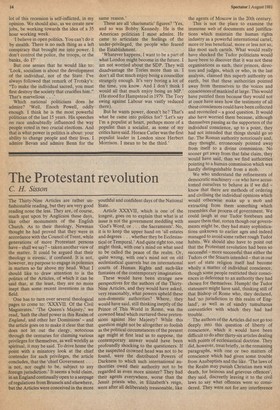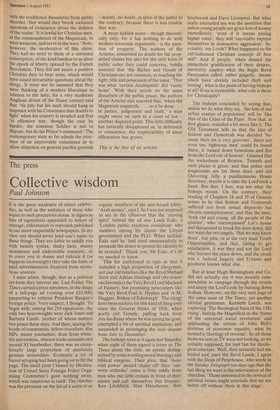The Protestant revolution
C. H. Sisson The Thirty-Nine Articles are rather unfashionable reading, but they are very good reading none the less. They are, of course, much spat upon by Anglicans these days, like other monuments of the English Church. As to their theology, Newman thought he had proved that they were in accordance with the Council of Trent, while generations of more Protestant persons have ŌĆö shall we say? ŌĆö taken another view of the matter. It could be argued that their theology is eirenic, if confused. It is not, however, my purpose to engage in polemics in matters so far above my head. What I should like to draw attention to is the politics of the Articles, of which it can be said that, at the least, they are no more inept than some recent inventions in this field.
One has to turn over several theological pages to come to: `XXXVII. Of the Civil Magistrates.' The Queen's Majesty,' we read, ',lath the chief power in this Realm of England, and other her Dominions' ŌĆö and the article goes on to make it clear that that does not let out the clergy, notorious through the centuries for claiming various privileges for themselves, as well worldly as spiritual, it may be said. To drive home the point with a minatory look at the chief contender for such privileges, the article concludes, that the 'chief Government . . . is not, nor ought to be, subject to any foreign jurisdiction.' It seems a bold claim, in an England continually open to a seepage of regulations from Brussels and elsewhere, but the Articles were conceived in the more youthful and confident days of the National State.
Article XXXVII, which is one of the longest, goes on to explain that what is at issue is not the government meddling with 'God's Word, or . . . the Sacraments'. No, it is to keep the upper hand on 'all estates and degrees . . . whether they be Ecclesiastical or Temporal.' And quite right too, one might think, with one's mind on what used to be called the peace of the realm. Or, quite wrong, with one's mind not on old ecclesiastical quarrels but on international courts of Human Rights and such-like fantasies of the contemporary imagination.
These would have been strange new perspectives for the authors of the ThirtyNine Articles, and they would have asked, very reasonably, what powers upheld these non-domestic authorities? Where, they would have said, still thinking ineptly of the Prince of This World in Rome, was the crowned head which nurtured these pretensions against Her Majesty? While this question might not be altogether so foolish as the political circumstances of the present age might at first lead us to suppose, the contemporary answer would have been profoundly shocking to the questioners. If the suspected crowned head was not to be found, were the distributed Powers of Darkness to which such international authorities owed their authority not to be regarded as even more sinister? They had their agents everywhere, worse than the Jesuit priests who, in Elizabeth's reign, were after all deliberately treasonable, like the agents of Moscow in the 20th century.
This is not the place to examine the immense web of documents and justifications which maintain the human rights industry as a powerful international cartel, more or less beneficial, more or less not so, like most such cartels. What would really have shocked the Tudor politicians would have been to discover that it was not these organisations as such, their princes, directors and judges, which or who, in the last analysis, claimed this superb authority on earth, but that these authorities pointed away from themselves to the voices and consciences of mankind at large. This would have puzzled them because they would not at once have seen how the testimony of all these consciences could have been collected and reconciled ŌĆö a good question. It would also have worried them because, although themselves passing as the supporters of the individual conscience, up to a point, they had not intended that things should go so far. The Roman authority notoriously and, they thought, erroneously pointed away from itself to a divine commission. No sooner get away from that false claim, they would have said, than we find authorities pointing to a human commission which was hardly distinguishable from a mob.
We who understand the refinements of democratic machinery ŌĆö or who have accustomed ourselves to behave as if we did ŌĆö know that there are methods of ordering and civilising the individual opinions which would otherwise make up a mob and extracting from them something which resembles due process of government. We could laugh at our Tudor forebears and assure them that, rotten though our governments might be, they had many sophistications unknown to earlier ages and indeed managed to avoid some rather rough Tudor habits. We should also have to point out that the Protestant revolution had been so successful ŌĆö more successful than either the Tudors or the Stuarts intended ŌĆö that in our sort of state religion itself had become wholly a matter of individual conscience, though some people restricted their consciences in deference to an authority they had chosen for themselves. Humph! the Tudor statesmen might have said, thinking still of that Bishop of Rome who, they declared, had 'no jurisdiction in this realm of England', as well as of sundry tumultuous conventicles with which they had had trouble.
The authors of the Articles did not go too deeply into this question of liberty of conscience, which it would have been difficult to do after thirty-six articles dealing with points of ecclesiastical doctrine. They did, however, treat briefly, in the remaining paragraphs, with one or two matters of conscience which had given some trouble from Anabaptists and the like. 'The laws of the Realm may punish Christian men with death, for heinous and grievous offences', they said, discreetly leaving it to the civil laws to say what offences were so considered. They were not for any interference With the traditional dissuasives from public disorder. Nor would they brook awkward questions of conscience about the defence of the realm: 'It is lawful for Christian men, at the commandment of the Magistrate, to wear weapons, and serve in the wars.' Note, however, the moderation of this claim. They had no need to think of a universal conscription, of the kind familiar to us since the epoch of liberty opened by the French Revolution. They did not assert a positive Christian duty to bear arms, which would have raised intractable questions about the Clergy. It must not be assumed that they were thinking of a modern liberalism in relation to the laity, for a very moderate Anglican divine of the Stuart century said that "tis pity but his neck should hang in suspence with his Conscience that doubts to fight' when his country is invaded and that 'in offensive war, though the case be harder, the common Soldier is not to dispute, but do his Prince's command.' The contemporary state so far admits the existence of an unprovable conscience as to allow objection on general pacifist grounds ŌĆö mainly, no doubt, in spite of the patter to the contrary, because there is less trouble that way.
A more ticklish point ŌĆö though theoretically only, for it has nothing to do with modern economic arguments ŌĆö is the question of property. The authors of the Articles, concerned no doubt for the propertied classes but also for the only form of public order they could conceive, boldly asserted that 'the Riches and Goods of Christians are not common, as touching the right, title and possession of the same.' That was what 'certain Anabaptists' did 'vainly boast'. With their minds on the same disturbers of the public peace, the authors of the Articles also asserted that, 'when the Magistrate requireth, . . . so it be done . . . in justice, judgement and truth,' a man might swear on oath in a court of law ŌĆö another disputed point. This little difficulty has naturally disappeared as, in deference to conscience, the respectability of mere affirmation has grown.
This is the first of six articles.



































 Previous page
Previous page